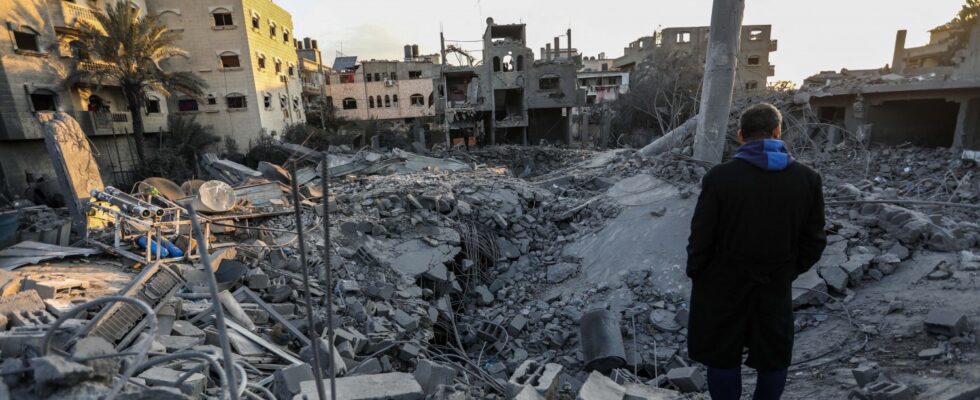The leader of the Palestinian terrorist movement Hamas, Ismaïl Haniyeh, is expected in Egypt on Thursday to discuss a new truce in the Gaza Strip where Israeli fighting and raids continue despite a critical humanitarian situation. During the night, witnesses reported Israeli strikes near the Nasser hospital in Khan Younes, a large town in the south of the territory where, according to Israel, local Hamas leaders are hiding. Over the past few days, the Israeli army had indicated that it had “encircled” the locality, defeated Hamas battalions towards its eastern portion and was now concentrating its actions on the western slope.
Information to remember:
- Ismaïl Haniyeh, the leader of Hamas, is expected in Egypt this Thursday to discuss a new truce in the Gaza Strip
- 119 people died during the night from Wednesday to Thursday, according to Hamas
- The UN reports “intense bombardments” across the Gaza Strip
The Hamas Health Ministry counted 119 dead in strikes in Gaza from Wednesday evening to Thursday morning, while the Palestinian Wafa agency reported violent clashes in Toubas, in the occupied West Bank. For its part, the UN reported “intense bombardments” across the Gaza Strip, and in particular in Khan Younes, indicating that 184,000 Palestinians had registered to request humanitarian aid after being forced to leave the western part of the city.
“At the moment, what is happening is a massacre,” Léo Cans, head of mission for Doctors Without Borders (MSF) in the Palestinian Territories, told AFP. “It is not possible that today in a war where people are not allowed to leave, where people are under siege, where they have nowhere to go, that we agree to kill 150 women and children per day (…) So the first demand is an immediate and total ceasefire,” he added.
“On the brink of the abyss”
Nearly four months after the start of the war which devastated the besieged Palestinian territory, the population is “starving” and “being pushed to the brink”, denounced an official from the World Health Organization (WHO) , Michael Ryan. According to a report by the UN Conference on Trade and Development (UNCTAD), half of all buildings in Gaza are damaged and the territory is “uninhabitable”.
Adding to the distress of the civilian population, the operations of the UN agency for Palestinian refugees (UNRWA) are under threat after donor countries suspended their contributions amid accusations by Israel against of 12 agency employees suspected of involvement in the October 7 attack.
That day, Hamas commandos from Gaza carried out an unprecedented attack on Israeli soil, which left around 1,140 dead, mostly civilians, according to an AFP count based on official Israeli figures. Some 250 people were kidnapped and taken to the Gaza Strip, around a hundred of whom were released at the end of November following a first truce, in exchange for Palestinian prisoners. In response, Israel vowed to “annihilate” Hamas and launched a vast military operation which left 26,900 dead, the vast majority civilians, according to the Palestinian movement’s Ministry of Health.
Truce talks
To support efforts for a possible second truce, the head of American diplomacy Antony Blinken will return “in the coming days” to the Middle East, an American official indicated without saying to which countries. The leader of Hamas, Ismaïl Haniyeh, based in Qatar, is expected in Egypt on Thursday to discuss an initiative formulated during a meeting last weekend in Paris between the director of the CIA, William Burns, and Egyptian officials, Israelis and Qataris.
According to a Hamas source, the Palestinian Islamist movement is examining a proposal in three phases, the first of which concerns a six-week truce during which Israel will have to release between 200 to 300 Palestinian prisoners in exchange for 35 to 40 hostages held in Gaza, and 200 to 300 aid trucks will be able to enter the Palestinian territory every day.
“Peace Commission”
For the moment, Hamas is demanding a total ceasefire as a prerequisite for any agreement, while the Israeli government is talking about a pause in the fighting but not the end of its operation in Gaza. “We are working to obtain another agreement for the release of our hostages, but not at any price,” Israeli Prime Minister Benjamin Netanyahu said Tuesday evening, under pressure from both the hostage families for a release and of members of his government hostile to an agreement which they believe would be too generous for the Palestinians.
On the sidelines of the mediation led by the United States, Qatar and Egypt, Colombian President Gustavo Petro, who openly supports the Palestinian cause and accuses Israel of currently committing a “genocide” in Gaza, proposed the establishment of a “peace commission made up of different countries” to ensure releases and an end to hostilities.
Outside of Gaza, the conflict still risks “metastasizing”, an expression recently used by the head of American diplomacy Antony Blinken to refer to the tensions on the Israeli-Lebanese border, but also in Iraq and in Yemen. There, the Houthi rebels, who since mid-November have been targeting international maritime transport in “solidarity” with Gaza, claimed responsibility for an attack on an American ship in the Gulf of Aden during the night. Shortly after, Washington announced that it had destroyed ten attack drones and a Houthi command post in Yemen.
